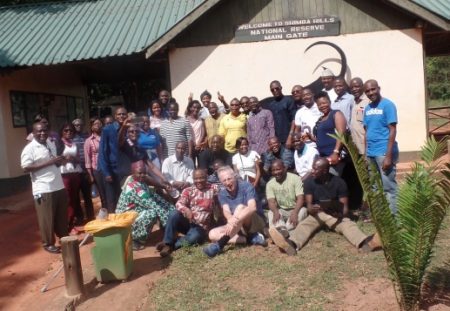 Hereby the course report of the 54th performance-based financing (PBF) course, which took place in Mombasa, Kenya from July 11 to July 22, 2016. There were 18 participants from Nigeria, 15 from Ghana, 2 from Cameroon and 1 from the DRC.
Hereby the course report of the 54th performance-based financing (PBF) course, which took place in Mombasa, Kenya from July 11 to July 22, 2016. There were 18 participants from Nigeria, 15 from Ghana, 2 from Cameroon and 1 from the DRC.
The facilitation team was this time enlarged with two extra facilitators: Dr. Olivier Basenya (of Burundi’s PBF Unit) and Dr. Francis Simo (Manager of the South West CDV Agency in Cameroon). The “village 54” chief, the Rev. Moses Jubula Thliza, together with his deputy, timekeeper and tax collector, actively supported the facilitation process and contributed to a congenial atmosphere and towards maintaining “order” in the village.
Seven participants obtained distinctions for their final test and in general the course achieved its objective to familiarise the participants with the PBF reforms towards universal health coverage.
The country recommendations were the following:
- It is proposed that the State PHCDAs should concentrate more on their regulatory role while autonomous NGOs might be contracted to implement the role of contract development and verification agencies. The State Financial Management Units should also become more independent from the SPHCDA and could be under the State Accountant’s Office.
- Organise feedback sessions with the SPHCDA, the Governor’s Office, the Commissioner of Health and partner organisations once back in the respective States.
- There is a need to integrate the different vertical programs sponsored by government or partner organisation in one holistic PBF approach.
- There is also a need to harmonise the PBF indicators with the HMIS system.
- Contract Nigerian NGOs to play the role of State CDV Agency
- PBF may also work on the demand side, creating supply incentives for patients through higher PBF subsidies. This would operate like conditional cash transfers for antenatal care, facility deliveries and postnatal care.
- Arrange for an advocacy meeting with the regional authorities of the ministry of finance (in the regional treasury) to address the issue of financial autonomy for health facilities in the project and the use of cost recovery revenues at facility level instead depositing the money in the government treasury.
- Health facility managers should have the right to decide where to buy their inputs and not be forced to buy from the South West Regional Fund for Health Promotion (SWRFHP).
- Advocate for training of a South West regional pool of experts (regulators, university staff, others)
- Revise the quality checklist.
- Establish a list of non-autonomous health facilities with the CDV Agency so that they can be targeted for making them autonomous.
- The regional regulators to encourage the RFHP to grant autonomy to all pharmacies in the PBF districts of Southwest region.
- Select additional districts in each region to obtain a representative population of at least 400,000 to sum up to a total of 1.6 million in the four regions. This will improve the economies of scale and prevent a too high proportion of the PBF budget to be spent on administrative costs.
- Increase the number of indicators from the current 8 to at least 25 outputs indicators required for a full package at both primary and first referral (hospital) levels.
- Expand the PBF program from a community intervention towards a more holistic approach including the district, hospital and health centre levels. This vertical integration is important for the referral and counter referral system and in line with the WHO district approach towards health systems.
- Develop the ToR for Regional CDV Agencies, which will verify all output data at health provider level. This separation of functions is important for advancing good governance and to prevent conflicts of interest between the regulator and the contract development and verification agencies.
- Develop sample contracts for all stakeholders.
- Revise the Ghana PBF manual to explain the details of the above recommendations. All these measures should lead to a new feasibility scan that will reach the 80% minimum standard and should avoid any killing assumptions.
- Set up a national PBF unit within the GHS but also with members form the Ministry of Health to guide the program and for the evaluation of performance of the regions, CDV agencies and districts.
- Develop an advocacy plan to better inform stakeholders about PBF. This may imply exchange visits to other countries, PBF courses and short workshops.
- Bring regulatory and decision making authorities on board. Schedule meeting with regulatory authorities (NHIA, Pharmacy council, FDA etc.).
DEMOCRATIC REPUBLIC OF CONGO
- Organize a workshop for the restitution of PBF course findings
- Towards Cordaid: Efficient use of the available budget for PBF: either reduction of the target or another advocacy for additional funding. Reduce the number of schools to be covered from 1350 to 560 or increase the budget so that it will meet the minimum possible ($ 20). The total budget will then be $ 45 225 000 (gap of $ 26 505 000).
- Towards the Ministry of Education: Conversion of certain input budget lines in the World Bank program into the PBF common basket.
- Organize a workshop for the revision and harmonization of the existing tools before implementation.




